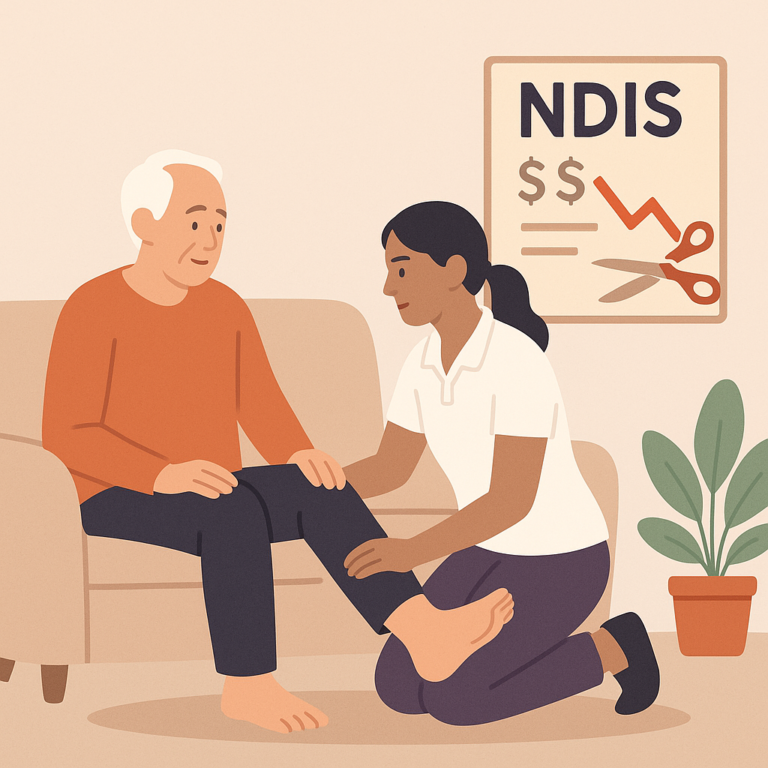NDIS Funding Cuts in 2025: What This Means for In-Home Physiotherapy

The 2025 Federal Budget has introduced significant shifts to the NDIS funding model, with cuts aimed at tightening access and redirecting funding. For participants and support coordinators alike, these changes can feel overwhelming — particularly when it comes to essential services like in-home physiotherapy.
So what do the NDIS funding cuts in 2025 actually mean for you, and how can Health Next Door help you continue accessing the care you need?
Table of Contents
ToggleA Quick Overview of the 2025 NDIS Funding Changes
As part of broader reforms, the Federal Government has committed to capping annual NDIS spending growth. For many participants, this could mean:
- More stringent plan reviews
- Tighter justification requirements for supports
- A potential reduction in therapy hour allocations
While the government has promised to preserve “reasonable and necessary” supports, it’s not yet clear how physiotherapy services will be evaluated — especially when delivered outside of traditional clinics.
How This Impacts In-Home Physiotherapy
For those relying on mobile physiotherapy in Sydney, mobile physiotherapy in Brisbane, or mobile physiotherapy in Gold Coast to manage mobility, pain, or post-surgical recovery, the funding changes may raise concerns.
Some potential effects include:
- Reduced funding for regular home visits
- Additional documentation required to justify continuation of care
- Pressure on participants and coordinators to shift to clinic-based models (even when they’re not suitable)
At Health Next Door, we’re already seeing clients in suburbs like Mosman, Varsity Lakes, and Chermside seeking guidance on how to maintain access to their preferred mode of care.
The Value of In-Home Physiotherapy Under the NDIS
Here’s the thing: in-home physiotherapy isn’t just a convenience — for many clients, it’s essential.
- It removes barriers for people with disability, cognitive conditions, or low mobility
- It supports safer outcomes in the person’s real environment
- It reduces transport strain and minimises cancellation risks
- It empowers participants to achieve meaningful daily goals, independently
This is why it’s so important to ensure your plan reflects the true functional value of physiotherapy in your home setting.
What You Can Do Now to Protect Your Access
If you’re concerned about how the 2025 NDIS funding cuts may affect your physiotherapy supports, here are a few steps to take:
1. Request Progress Reports From Your Current Physio
At HND, we regularly provide reports outlining therapy goals, session outcomes, and future recommendations — this evidence is vital during plan reviews.
2. Speak to Your Support Coordinator or Plan Manager
They can advocate for your needs and help interpret plan changes as they’re rolled out.
3. Maintain a Clear Record of Functional Improvements
Note down key improvements — e.g. reduced falls, better transfers, or increased independence at home.
4. Choose a Provider That Understands the NDIS
Our team has deep experience with NDIS physiotherapy and collaborates closely with clients, families, and coordinators to ensure plans are both realistic and effective.
How Health Next Door Can Help
At Health Next Door, we provide mobile physiotherapy across greater Sydney, Brisbane, and the Gold Coast. We work with participants in suburbs such as Mount Gravatt, Castle Hill and Mermaid Beach — ensuring personalised, home-based therapy that aligns with their NDIS goals.
We’ll help you:
- Understand your current plan
- Navigate potential cuts
- Provide therapy reports and outcome tracking
- Advocate for continued in-home support
Need Support Navigating NDIS Changes?
The NDIS funding cuts in 2025 don’t have to mean less care. With the right documentation and a provider who understands your goals, you can continue receiving high-quality, in-home physiotherapy that meets your needs.
Talk to the Health Next Door team today about how we can support you through upcoming plan reviews, or visit our NDIS physiotherapy page for more information.
Health Next Door, we bring mobile physiotherapy to your doorstep, ensuring a patient-centric approach that prioritizes your needs and goals. Our experienced physiotherapists assess your condition and create a personalized therapy plan, helping you recover in the comfort of your home with expert care tailored just for you. With our comprehensive mobile physiotherapy services, you get professional treatment for pain relief, injury recovery, and mobility improvement—all without leaving your home. Experience convenient, high-quality care designed to fit your lifestyle.
View All Articles
